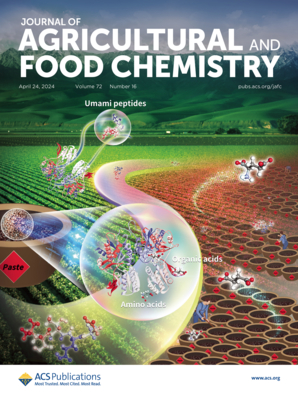Engineering a Novel Alginate Lyase for Improved Thermostability and Evaluation of Promoting Effects of Its Degradation Products on Brassica rapa var. chinensis under Salt Stress Environments.
IF 6.2
1区 农林科学
Q1 AGRICULTURE, MULTIDISCIPLINARY
引用次数: 0
Abstract
Alginate lyases catalyze depolymerization of alginate, a major polysaccharide in brown algae, into bioactive oligosaccharides. Herein, the gene (CelPL7A) encoding a PL7 family alginate lyase from Cellulophaga lytica was cloned, heterologously expressed in Escherichia coli, and characterized. CelPL7A exhibited maximum activity at 30 °C and pH 8.0 but limited thermostability. To enhance its thermal stability, rational design was employed and yielded three single mutants (N99G, T331D, and G346S). All three mutants exhibited significantly enhanced thermal stability. Their specific activities were enhanced to 2.7-, 2.3-, and 3.2-fold, respectively, compared to the wild-type enzyme. Both CelPL7A and the G346S mutant efficiently degraded pretreated kelp powder, primarily yielding trisaccharides. Application tests demonstrated that alginate oligosaccharides (AOS) produced by CelPL7A significantly promoted the seed germination and seedling vigor of pak choi (Brassica rapa var. chinensis) under salt stress. These results suggest that engineered variants are promising biocatalysts for AOS production and agricultural biostimulant development.盐胁迫环境下改良海藻酸盐裂解酶及其降解产物对中国芸苔热稳定性的促进作用
褐藻酸盐裂解酶催化褐藻酸盐解聚成具有生物活性的低聚糖。本文克隆了来自lylophaga的PL7家族海藻酸解酶基因(CelPL7A),在大肠杆菌中异种表达,并对其进行了表征。CelPL7A在30°C和pH 8.0时表现出最大活性,但热稳定性有限。为了提高其热稳定性,对其进行了合理设计,得到了3个单突变体(N99G、T331D和G346S)。三种突变体均表现出显著增强的热稳定性。与野生型酶相比,它们的比活性分别提高了2.7倍、2.3倍和3.2倍。CelPL7A和G346S突变体都能有效降解预处理过的海藻粉,主要产生三糖。应用试验表明,CelPL7A产生的海藻酸寡糖(AOS)能显著促进盐胁迫下小白菜(Brassica rapa vara . chinensis)种子萌发和幼苗活力。这些结果表明,工程变异体是生产AOS和开发农业生物刺激素的有前途的生物催化剂。
本文章由计算机程序翻译,如有差异,请以英文原文为准。
求助全文
约1分钟内获得全文
求助全文
来源期刊
CiteScore
9.90
自引率
8.20%
发文量
1375
审稿时长
2.3 months
期刊介绍:
The Journal of Agricultural and Food Chemistry publishes high-quality, cutting edge original research representing complete studies and research advances dealing with the chemistry and biochemistry of agriculture and food. The Journal also encourages papers with chemistry and/or biochemistry as a major component combined with biological/sensory/nutritional/toxicological evaluation related to agriculture and/or food.

 求助内容:
求助内容: 应助结果提醒方式:
应助结果提醒方式:


